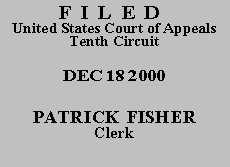

| AG SERVICES OF AMERICA, INC.,
an Iowa corporation,
v.
JOHN D. NIELSEN, a/k/a JACK
NIELSEN Defendants-Third-Party Plaintiffs-Third-Party Counter-Defendants-Appellants, v. TERRY LUNDELL, Third-Party Defendant- Third-Party Counter-Claimant. |
|
Stephen S. Hamilton, Montgomery & Andrews, P.A., Santa Fe, New Mexico, (Laurice Margheim, Curtiss, Moravek, Curtiss & Magheim, Alliance, Nebraska, with him on the briefs) for Defendants-Appellants.
On consideration of the petition for rehearing en banc filed by Plaintiff Appellee AG Services of America, Inc., the court finds and concludes as follows:
The petition argues that our opinion conflicts with more recent Tenth Circuit decisions on the scope of issue preclusion, relying on the well-established rule cited in Turney v. O'Toole, 898 F.2d 1470, 1472 n.1 (10th Cir. 1990), that issue preclusion applies only to issues actually and necessarily decided by the prior case. Our opinion also applied that same rule and the asserted conflict with our other precedents is not present. Our opinion is consistent with Turney because, as we explained, any and all implications from the jury verdict here were found to be fundamentally inconsistent with critical findings by the trial judge. See Opinion at 14 ("[A]ny explanation for the jury's decision that Nielsen did not convert the Frito-Lay proceeds leads inexorably to the conclusion that the jury found no wrongdoing by Nielsen.").(1)
The petition also argues that the jury might have made findings for Nielsen on defenses raised at trial, for example the defense of limitations, which would not have conflicted with the trial judge's findings on the equitable claims. This argument (which was previously made and was rejected, rather than having been ignored) does not withstand analysis. If it is assumed, arguendo, that the jury's decision was based at least in part on limitations, it is necessary to consider whether that could have been the sole basis for the general verdicts. In pondering that question, we conclude that the answer must be in the negative. Because the jury returned a verdict in favor of AG Services and against DHFC on the conversion claim, it is apparent that the jury found that the conversion claim was not barred in its entirety. Thus, to the extent that the verdicts were based on limitations, the jury must have found that DHFC, but not Nielsen, was estopped from relying on limitations, based on the instructions of the court. See I Aplt. App. 350-51.(2)
If then, the verdict in favor of Nielsen is assumed, arguendo, to have been based on limitations, the jury under that hypothesis must have found that Nielsen did not engage in conduct which amounted to a false representation or concealment of material facts or conduct calculated to convey an impression that the facts were inconsistent with what he now asserts. We are persuaded that such an implied finding completely undercuts the trial judge's basis for the findings that Nielsen had misused the corporate entity or otherwise committed conduct which made his "enrichment" unjust.
Accordingly, this panel orders that the petition for rehearing is denied. The suggestion of rehearing en banc having been submitted to the members of the panel and all the active judges of the court, and no judge having requested a poll on the suggestion, see Rule 35, Fed. R. App. P., rehearing en banc is denied.
Entered for the Court
Patrick Fisher, Clerk
By:
Keith Nelson
Deputy Clerk
*.The Honorable H. Dale Cook, Senior United States District Judge of the Northern, Eastern and Western Districts of Oklahoma, sitting by designation.
1.Our opinion cited our other precedents which are harmonious with Turney and its reasoning that "collateral estoppel applies only to issues which have been actually and necessarily decided." Turney, 898 F.2d at 1472 n.1. Our opinion recognizes that rule by citing Robinson v. Volkswagenwerk AG, 56 F.3d 1268, 1273 (10th Cir. 1995); Skinner v. Total Petroleum, Inc., 859 F.2d 1439, 1442-43 (10th Cir. 1988); and Butler v. Pollard, 800 F.2d 223, 224-26 (10th Cir. 1986).
2.Instruction 8-AC told the jurors, inter alia, that a party is estopped from relying on the statute of limitations if that party is guilty of "conduct which amounts to a false representation or concealment of material facts, or, at least, which is calculated to convey the impression that facts are otherwise than, and inconsistent with, those which the party subsequently attempts to assert." The estopped party must also have intended that the other party rely on that conduct while himself having actual or constructive knowledge of the real facts. I Aplt. App. 351.